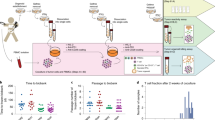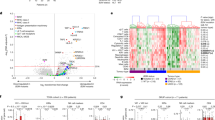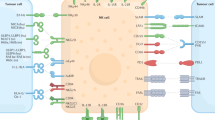Abstract
The cytotoxic activity of peripheral-blood (PBL), lymph-node (LNC) and tumour-infiltrating lymphocytes (TIL) from 47 patients undergoing surgery for colon carcinoma (Duke's Stage A, 1 patient, B, 24; C, 15 and C with metastases, 7) was examined in short-term 51Cr-release assays, against fresh autologous tumour cells, allogeneic colon cancer cells and the erythroleukaemia cell line, K562. Cytotoxicity against autologous cells was detected in at least one effector population in 23/47 patients (49%), with overall frequencies which did not differ for patients in different Duke's stages of disease. By contrast, lysis of allogeneic tumour cells was infrequent (11%) regardless of the effector population to which they were exposed. Cytotoxicity against K562, cells highly sensitive to NK activity, though variable, was detected in 93% of PBL of normal donors and 83% of patients, and among the latter showed no evidence of significant decline with advancing disease. However, LNC and TIL anti-K562 activity was infrequent (17%) in concordance with previous reports. There was no correlation between the ability of patients' PBL to lyse autologous tumour and K562 cells. The independence of these 2 cytotoxic actions was further explored in studies fractionating lymphocytes: autologous tumour killing was augmented in T-enriched PBL, whereas the greatest anti-K562 activity was found in the corresponding non-T fraction. Lymphocyte cytotoxicity in colonic neoplasia is thus manifest in 2 apparently independent lymphocyte populations, a relatively specific killer T-cell population, detectable in PBL, LNC and TIL, which is preferentially reactive with the autologous cells, and a non-specific killer population, largely limited to PBL, with the properties of NK cells. The activity of neither population reflects the clinical status of patients with this disease.
This is a preview of subscription content, access via your institution
Access options
Subscribe to this journal
Receive 24 print issues and online access
$259.00 per year
only $10.79 per issue
Buy this article
- Purchase on Springer Link
- Instant access to full article PDF
Prices may be subject to local taxes which are calculated during checkout
Similar content being viewed by others
Rights and permissions
About this article
Cite this article
Vose, B., Gallagher, P., Moore, M. et al. Specific and non-specific lymphocyte cytotoxicity in colon carcinoma. Br J Cancer 44, 846–855 (1981). https://doi.org/10.1038/bjc.1981.283
Issue Date:
DOI: https://doi.org/10.1038/bjc.1981.283
This article is cited by
-
Clinical significance of autologous tumor killing (ATK) activity and its induction therapy in human cancer
Biotherapy (1994)
-
Biological significance of autologous tumor-killing activity and its induction therapy
Cancer Immunology Immunotherapy (1993)
-
Functional capacity of a tumor-infiltrating B-cell line: Lymphokine secretion
Immunologic Research (1992)
-
Tumour-associated proliferative responses in vitro of regional lymph nodes draining solid cancers in man
Cancer Immunology Immunotherapy (1989)
-
Depressed level of natural killer cells in cancer family syndrome
Cancer Immunology Immunotherapy (1989)



